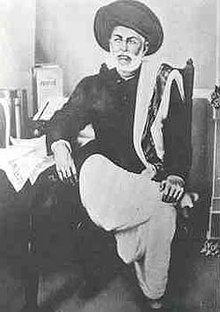Mahatma Jyotirao Phule
| Jyotirao Govindrao Phule (ज्योतिराव गोविंदराव फुले) | |
|---|---|
 |
|
| Born |
11 April 1827 Khanwadi,Pune, British India (present-day Maharashtra, India) |
| Died | 28 November 1890 (aged 63) Pune, British India (present-day Maharashtra,India) |
| Other names | Mahatma Phule/Jyotiba Phule/ Jotiba Phule / Jotirao Phule |
| Spouse(s) | Savitribai Phule |
| Era | 19th century philosophy |
|
Main interests
|
Ethics, religion, humanism |
|
Influences
|
|
Jyotirao Govindrao Phule (11 April 1827 – 28 November 1890) was an Indian activist, thinker, social reformer and writer from Maharashtra.
His work extended to many fields including eradication of untouchability and the caste system, women's emancipation and the reform of Hindu family life. In September 1873, Phule, along with his followers, formed the Satyashodhak Samaj (Society of Seekers of Truth) to attain equal rights for peasants and people from lower castes. Phule is regarded as an important figure of the Social Reform Movement in Maharashtra. He and his wife, Savitribai Phule, were pioneers of women's education in India. He is most known for his efforts to educate women and the lower castes. He opened the first school for girls in India in August 1848.
Jyotirao Govindrao Phule was born into a virtually illiterate family that belonged to the Mali caste of gardeners and vegetable farmers. The original surname of the family had been Gorhay(गोऱ्हे), and their family originally hailed from Katgun, a village in Khatav taluka of Satara District (now in Maharashtra state). Phule's great grandfather was worked as chaugula, a village servant. Family of his great grand father belongs to Kshatriya Mali caste. Mahatma Jyotiba's great granddfather had settled in Khanwadi near Pune. There a son was born, Shetiba, a grandfather of Jyotiba Phule and his grandfather prospered after starting a business of selling flowers, garlands and flower arrangements for religious and social events like weddings. The family owned some farmland as well as a shop in the city. Since Phule's father and two uncles served as florists under the last of the Peshwas, whose patronage they enjoyed, the family came to be known as 'Phule' (flower-man).
Phule's father, Govindrao, carried on the family business along with his brothers. His mother, Chimnabai, died when he was only nine months old, and he had one elder brother. The Mali community did not set much store by education, and after attending primary school to learn the basics of reading, writing and arithmetic, Phule was withdrawn from school. He joined the menfolk of his family at work, both in the shop and the farm. However, a Christian convert from the same Mali caste as Phule, recognized his intelligence and persuaded Phule's father to allow Phule to attend the local Scottish Mission's High School run by Murray Mitchell. Jyotirao completed his English schooling in 1847. As per custom, he was married young, at the age of 13, to a girl of his own community, chosen by his father.
...
Wikipedia
